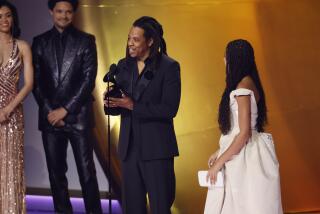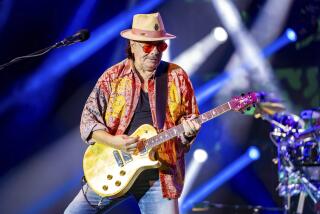Mention of anti-gay lyrics isn’t Banton’s only message
- Share via
REGGAE artist Buju Banton wanted to address his detractors Tuesday, and he didn’t mince words.
The lanky singer had been scheduled to perform at the Highlands, but instead took the stage at the Century Club after a campaign led by local black gays and lesbians caused Highlands management to cancel his performance there.
“The ruthless gay community is trying to shut us down,” Banton said to a round of cheers from fans. “They ask for tolerance, but they don’t seem to be tolerant.”
The controversy surrounding Banton stems from his 1992 song “Boom Bye Bye,” on which he advocated violence against gay men. The Jamaican musician performed a brief portion of the song Tuesday, using it as a bridge into his commentary, reiterating that he’d sung it 14 years ago and that he’d rather have listeners focus on dozens of subsequent songs calling for peace, racial unity and social justice.
It was a seemingly out-of-place moment during Banton’s otherwise upbeat, energetic 75-minute performance, which drew no protesters. Wearing a white suit and sporting his trademark dreadlocks, Banton hit the stage with a burst of energy, providing a sizzling rendition of his “Gold Spoon.” With three female singers and a four-piece band backing him, Banton efficiently ripped through several songs before getting to “Mr. Nine,” a cautionary tale about the havoc guns have brought to his country.
Stopping the music, Banton delivered his first message: “We’ve got to make the best of ourselves,” he said. “We’ve got to look forward to tomorrow. We are all sisters and brothers.”
Banton’s band then played the soothing notes to “Destiny,” a standout about overcoming obstacles from his stellar “Inna Heights” album. From there, he went into a collection of mellow roots songs, including the similarly themed “Not an Easy Road.” That song appeared on 1995’s “ ‘Til Shiloh,” which Spin listed as one of the Top 20 albums of that year.
For much of the night, Banton’s interplay with his smooth backup singers was similar to that Bob Marley had with the Wailers. As Marley did, Banton, through his music and words Tuesday, primarily encouraged people to rally against oppression and become self-sufficient.
After concluding his spry set with the forceful anti-violence tune “Murderer,” Banton made good on his status as a reggae ambassador.
“We thank you for your time, for your patience,” Banton said to the crowd, a nod to the fact that he took the stage shortly before 1 a.m. “We thank you most of all for your love of reggae music.”
More to Read
The biggest entertainment stories
Get our big stories about Hollywood, film, television, music, arts, culture and more right in your inbox as soon as they publish.
You may occasionally receive promotional content from the Los Angeles Times.










